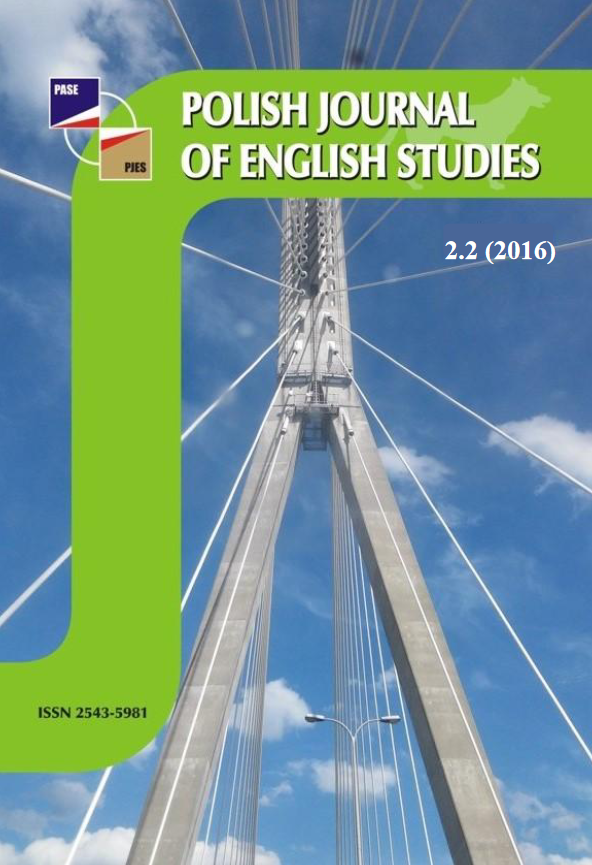Numer 2.2 (2016)
|
Spis treści
Strony
Pobierz
|
|||||
|
|
|||||
|
INFORMACJE O AUTORZE |
|||||
|
Paweł Stachura
The Strategy of Indirect Approach: Centre and Periphery in Fiction about the First World War
7 – 23
|
|||||
|
Słowa kluczowe First World War |indirect approach |core and peripheryStreszczenie The article discusses a number of World War novels writtenin countries or areas described as secondary theatres of war. Operations in those theatres were often mentioned as examples of the ‘strategy of indirect approach, ’that is as attempts to disrupt the enemy’s war effort by attacking in an unexpected, seemingly remote and unimportant place. During the First World War, the Gallipoli Campaign was the best-known example of this strategy, but indirect strategy propagated the war in many other countries, and affected a great variety of literary cultures. Therefore, the article is an attempt to compare the principles of indirect-approach strategy with the literary responses to war in those areas where the war was fought according to those principles. There seem to be some interesting parallels between military strategy and literary work created in the areas affected by it. INFORMACJE O AUTORZE |
|||||
|
Konstantinos D. Karatzas
The Participation of Greece (Hellas) in the First World War: Literary Representation
25 – 39
|
|||||
|
Słowa kluczowe First World War |Greece |war novelStreszczenie The article presents Greek novels about the country’s participationin the First World War, a particularly interesting case, since Greece wasan important secondary theatre of war. The author presents the turbulent and ambiguous historical background of the novels: Greece’s forced entry into the war, and the failed intervention in Asia Minor in the final year of the war. Most of the novels under discussion were important events in the historyof Greek modernism. INFORMACJE O AUTORZE
Universidad de Zaragoza, Hiszpania
|
|||||
|
John Dean
Divided Loyalties: Cultural Conflicts in the Nation & Detroit in America’s WW1 Era
41 – 85
|
|||||
|
Słowa kluczowe First World War |Detroit |melting pot |identityStreszczenie The article presents the responses to the First World War in Detroit, a booming multicultural community at the time. Drawing on a variety of sources, including previously unpublished archival material, the author describes the various conflicted ethnic and social groups reluctantly entering the war. The article demonstrates how difficult it was to achieve and maintain social cohesion in acountry that still was not directly related to the war. INFORMACJE O AUTORZE
Université de Versailles, Francja
|
|||||
|
Martyna Kliks
A Polish Voice from the Depths of an International Conflict: Wartime Writings by Witold Hulewicz
87 – 97
|
|||||
|
Słowa kluczowe Witold Hulewicz |First World War |Poland |modernismStreszczenie Although Poland was geographically not a secondary theatre of war, the position of the Poles bore a strong resemblance to the position of people’s in secondary theatres of war. The nation was divided, with Polish nationals serving in German, Austrian, Russian, and French armies, which occasionally led to tragic instances of fratricidal combat. Consequently, Poles resorted to literary strategies of indirect approach, and Witold Hulewicz’s early modernist poetry might be interpreted in these terms. |
|||||
|
|
|||||
|
Słowa kluczowe First World War |modernism |Mendi |South Africa |death |sinkingStreszczenie The article is an ambitious and complex study of Black response to war trauma, occasioned by the tragedy of the Mendi, a troop transport sunk with great loss of life in 1917. The majority of the victims were South African Blacks on their way to the Western Front. The tragedy inspired a very powerful poetic response, which the author analyses in terms of an indigenous African modernism, and which later on prepared the ground for contemporary nationalist mythopoeia in the Republic of South Africa. Although the country was partof the British Empire in 1917, the position of the Black community was reminiscent of the nations in secondary theatres of war. The recurring presence of the tragic event in South African culture has been analysed in termsof Derrida’s hauntology. |
|||||
|
|
|||||

